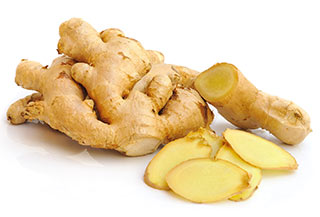In the alternative, complementary and integrative medical community, it is well known that ginger has anti-inflammatory and anti-oxidative effects, which makes it a popular herbal supplement in inflammatory diseases. This new study offers insight into what happens when researchers and physicians, who are not familiar with its beneficial properties, are enlightened and see the convincing evidence they need to move into bigger human trials.
A Michigan Medicine led study published in JCI Insight, studied the main bioactive compound of ginger root, 6-gingerol, as a potential therapeutic to counter the mechanism that fuels certain autoimmune diseases in mice. Researchers specifically looked at lupus, often associated with antiphospholipid syndrome and leading to blood clots, widespread inflammation and organ damage.
In mice with either antiphospholipid syndrome or lupus, 6-gingerol prevented neutrophil extracellular trap release, which is triggered by the autoantibodies that these diseases produce.
The study question was: “Will the anti-inflammatory properties of ginger extend to neutrophils, and specifically, can this natural medicine stop neutrophils from making neutrophil extracellular traps (NETs) that contribute to disease progression?”
“This pre-clinical study in mice offers a surprising and exciting, ‘yes’,” said, lead researcher Ramadan Ali, Ph.D.
Ali discovered that after giving 6-gingerol, the mice had lower levels of NETs. Their tendency to make clots was also drastically reduced and 6-gingerol appeared to inhibit neutrophil enzymes, phosphodiesterases, which in turn reduced neutrophil activation.
But the most surprising find of all was that the mice, regardless of whether they had antiphospholipid syndrome or lupus, had reduced autoantibodies suggesting the inflammatory cycle, autoantibodies stimulating NETs which stimulate more autoantibodies, was broken.
Next steps and potential implications
“Through my years of medical training I wasn’t taught much about supplements, but it’s something that so many patients ask me about,” says study author and rheumatologist Jason Knight, M.D. “When Ramadan brought the concept to me, I was enthusiastic to pursue it in my lab, as I knew it would matter to them. Sometimes our patients give us really good ideas!”
Although the study was done in mouse models, Ali and Knight think the preclinical data, showing that 6-gingerol has anti-neutrophil properties and may protect against autoimmune disease progression, could lead to further clinical trial development.
“As for basically all treatments in our field, one size does not fit all. But, I wonder if there is a subgroup of autoimmune patients with hyperactive neutrophils who might benefit from increased intake of 6-gingerol,” Knight says. “It will be important to study neutrophils before and after treatment so we can determine the subgroup most likely to see benefit.”
The team is particularly interested to see if the natural supplement may help those at high risk for disease development. “Those that have autoantibodies, but don’t have activated disease, may benefit from this treatment if 6-gingerol proves to be a protective agent in humans as it does in mice,” Ali says, who’s passionate about natural medicine research for rheumatic diseases.
“Patients with active disease take blood thinners, but what if there was also a natural supplement that helped reduce the amount of clots they produce? And what if we could decrease their autoantibodies?”
Conclusion/ These researchers, who were unfamiliar with the benefits of nutraceuticals, were surprised by the positive results. In the study, they ask: “What if future studies used ginger supplements to individuals at high risk for autoimmune conditions and/or cardiovascular disease (for example, individuals with autoantibodies who have yet to have clinical events or patients with cardiovascular risk factors)? In such scenarios, its antineutrophil properties might prove protective against disease emergence. Based on the data presented here, we would argue that such studies should have not only clinical endpoints, but also mechanistic endpoints focusing on neutrophil activity,” they write.
Click Here for Full Text Study
Source: Ramadan A. Ali, Duxin Sun, Jason S. Knight et al. Antineutrophil properties of natural gingerols in models of lupus. JCI Insight. 2021;6(3):e138385. https://doi.org/10.1172/jci.insight.138385.





